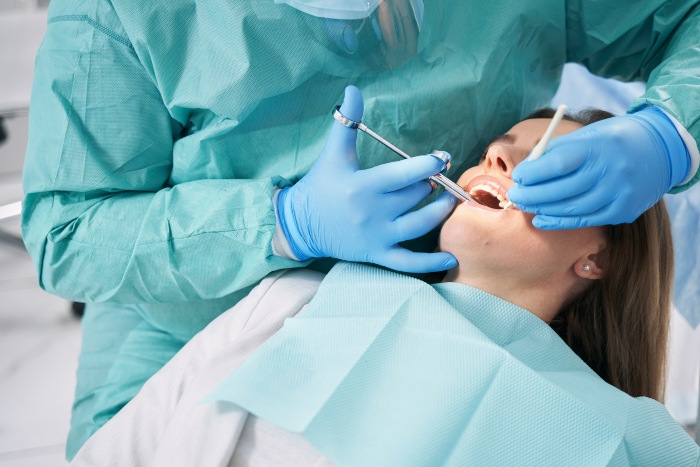Sedation Dentistry in Laurel, MD
What Is Sedation Dentistry?
Sedation dentistry is a method of painless dentistry in which a medication is administered that reduces anxiety, calms your nerves, prevents pain, and makes the dental experience more comfortable. At Dr. Batz & Weiner Family Dentistry, we may recommend sedation dentistry for younger patients who might not be able to sit still for an entire procedure, patients with extreme dental anxiety, and patients undergoing a lengthy treatment. We are certified in oral sedation dentistry, nitrous oxide sedation, and intravenous sedation. We will discuss your options with you in detail so that you can make an informed decision. Our goal is safe, painless dentistry so our patients can get the care and treatment they need to protect their teeth and overall health. Call us today to discuss your options for sedation dentistry in Laurel, MD.
Levels of Sedation Dentistry
There are four levels of sedation dentistry, and the difference between them is how sedated you will be. We will help you determine which level is right for you based on your age, overall health, anxiety level, the procedure being performed, and the length of the procedure. Before your procedure is scheduled, we will go over all of your options in detail and make sure you’re able to make an informed decision about your care. The four levels of dental sedation are:
- Mild or Minimal Sedation – Mild or minimal dental sedation, or conscious sedation, will calm your nerves and help you feel less anxious or fearful. We will administer nitrous oxide to you through a mask, and you will still be awake and conscious during the procedure, and you can respond to questions. This type of dental sedation is safe for children and adults and wears off quickly with minimal side effects. We may recommend oral conscious sedation for simple extractions, dental crowns, and fillings.
- Moderate Sedation – Moderate sedation is a method of oral sedation that is administered in pill form. You will still be awake and conscious, but you will be deeply relaxed and may have trouble answering questions or remembering parts of the procedure. We may recommend moderate sedation for longer procedures, root canals, non-surgical wisdom tooth extraction, and multiple crowns or dental fillings.
- Deep Sedation – Deep sedation is administered via IV or intravenously. It causes ‘twilight sleep,’ which is the feeling of being just barely conscious. You likely won’t be able to answer questions, and you will probably not remember any part of the procedure. We typically recommend deep sedation for procedures like surgical wisdom tooth extraction, root canals, dental implants, and periodontal surgery.
- General Anesthesia – General anesthesia is the strongest type of dental sedation. You will be fully unconscious throughout the procedure. We may recommend general anesthesia for lengthy, complex, or extensive oral surgeries like multiple dental implant surgery, complex surgical wisdom tooth removal, extensive periodontal surgery, all-on-4 dental implant procedures, TMJ surgery, bone grafting, and complex root canal therapy.
Types of Sedation Dentistry

We specialize in the three primary types of sedation dentistry: nitrous oxide sedation, oral conscious sedation, and intravenous sedation. We will fully explain all methods during your initial consultation with our sedation dentist.
- Nitrous Oxide Sedation – Nitrous oxide is a gas inhaled through a mask. It is also called laughing gas. The effects occur in three to five minutes, and the drug leaves your system very quickly when the procedure is over.
- Oral Conscious Sedation – Oral conscious sedation is administered in pill form and is typically a type of anti-anxiety medication like triazolam or another medication in the diazepam family. They typically take around 30 minutes to go into effect, and the effects can last for hours or even the entire day. We will also administer a local anesthetic before the procedure begins.
- Intravenous Sedation – Intravenous or IV sedation is administered through a needle in a vein in your arm or hand. This type of sedation may make you fall asleep, and the results may last for 30 minutes to two hours after your procedure.
Benefits of Dental Sedation
Undergoing dental sedation will ease your fear, anxiety, and discomfort associated with the dental procedure. It will make the procedure easier for us to perform, as we can operate with more precision. Dental sedation is particularly helpful with young patients who might have trouble staying still or remaining calm throughout a procedure. We will also be able to work faster while you’re under sedation, so your procedure will be done quicker. If you have been avoiding necessary oral or dental care due to dental anxiety or phobia, dental sedation allows you to get the care you need to protect your health and avoid serious complications like pain, tooth decay, infection, abscesses, and tooth loss.
Who Should Consider Oral Sedation
We can offer sedation dentistry to all patients, even children. You should consider oral sedation if you:
- Have severe dental anxiety or fear that prevents you from getting certain procedures done.
- You have a severe gag reflex.
- Your teeth are very sensitive.
- You are undergoing a lengthy procedure.
- Your child is undergoing a lengthy procedure and may be unable to sit still the whole time.
- You can’t undergo local anesthesia.
- You have special needs or trouble controlling your movements.
Contact Our Sedation Dentist to Make an Appointment
If you’re interested in learning more about your options for dental sedation, call our sedation dentist in Laurel, MD, today or contact us online. At Dr. Batz & Weiner Family Dentistry, we have extensive experience, training, and education in all sedation dentistry methods and are certified to administer nitrous oxide, intravenous sedation, and oral sedation. Is fear, anxiety, dental phobia, or another issue preventing you from getting the oral or dental care you need? If so, we recommend that you consider sedation dentistry to overcome your challenges and maintain the health of your teeth, mouth, and gums.
